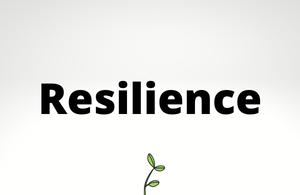
There’s no doubt about it: 2020 was stressful. STRESS-FUL.
Even those of us who secretly quite enjoyed lockdown – hi! – will have felt the effects of working flat out to mitigate a financial disaster, separated from our colleagues. Oh, and the pandemic bit as well.
Resilience is a key skill any small business needs to be growing in its teams right now.
What resilience means in a professional setting
Resilience feels to me like the opposite of fear. The opposite of black-and-white, all-or-nothing thinking. The opposite of perfectionism.
It doesn’t mean being happy all the time, or never having problems. Resilient teams adapt to changing circumstances, confidently approach obstacles and cope with hard situations in a healthy way.
We’ve never needed those skills more within our small businesses.
Resilient skills include:
- Keeping a holistic and strategic perspective of tasks or challenges – not obsessing over each item
- Knowing when to call ‘enough’, whether on the workday or the number of edits to a piece of work
- Valuing initiative and creativity over rigid adherence to process
- Taking a balanced view of mistakes and problems: learning from errors rather than taking them to heart
- Understanding that everyone brings something different to the table and we need those differences to succeed
How to help your team grow their resilience
1. Turn rules into guidelines
Rules make people afraid to make mistakes, and that can hugely affect confidence, initiative and creativity. No one should be reckless, but if you’ve hired a great team, that’s a given. Trust them.
Mistakes happen. And when people make mistakes, they need to be able to forgive themselves. That starts with feeling like their boss will forgive them, too.
Analogy time.
I took up rollerskating this year, at the ripe old age of 31. With skating, you don’t get anywhere if you’re terrified of falling. You have to fall loads to get over it. Learn to fall safely, learn to fall with a laugh, learn to fall and then get up and nail the trick.
I sprained both my wrists over the summer because I wasn’t wearing my wrist guards – what a fool. After that, I was nervous skating until the very next time I fell and remembered falling is OK as long as you’re not reckless.
2. Devalue perfectionism
Expect good, reward great.
When we expect perfect, we’re setting ourselves up for misery and failure. When we put that expectation on our teams, we’re creating a toxic work culture.
To build resilient teams, we have to empower people to aim for consistently good results over perfect results. The psychological concept of satisficers vs. maximisers can help us work this through.
Satisficers
Satisficers are individuals who can accept ‘good enough’ – not necessarily the very best outcome in all respects. A satisficer is less likely to waste time on regret after a decision, even if a better option comes along afterwards. They will manage their time well, judging the practical benefit of a task over the emotional baggage of it. They will be happier, and they will live a more balanced life. Because of that, they’re likely to have better outcomes for their work.
Maximisers
Compared to satisficers, maximisers will always be striving for the best outcome at any cost. They’re more likely to experience lower levels of happiness, regret and self-esteem. They also tend to be perfectionists, with unhealthy expectations. They’ll punish themselves for mistakes and have a negative impact on team members.
The lesson there is that we should train our teams to listen to their instinct but not worry about getting the very best all the time. We should evaluate each task or outcome on its own practical value, not its emotional load.
As people managers, we have to know when to call ‘enough’. Agonising over something wastes time. A good piece of work executed today is better than a theoretically perfect piece of work malingering on a project plan.
Perfectionism is the absolute death of good work shipped fast – or at least good work that doesn’t cost us our sanity and happiness.
3. Only keep processes that help, not hinder
Processes exist to make our work more efficient or to protect us. They shouldn’t become the entire focus on our day.
If a process is too manual or arduous, it’s time to think about either ditching it or automating it. Otherwise, we obsess over the process and not the desired outcome. That kills initiative because – again – people are afraid to step out of a process in case they make a mistake.
Processes that are hindering, or even harming, more than they’re helping have got to go.
4. Focus on wellbeing
Building resilient teams demands health and happiness as a foundation. You can’t weather storms if you’re physically or mentally stressed.
Yes, 2020 has demanded a lot from all of us. We’ve had to lean on our teams to make it through this far. We owe them our thanks, support and understanding.
Humans need exercise, rest, nourishment and connection. The way in which we find them looks different for everyone, so there’s no prescription here. We just have to allow people the space, time and energy to find what works for them.
We can supplement it with pay rises where we can afford it, vouchers for the gym, discounts for healthy subscription boxes, counselling services, staff forums – a million things. But at the heart of it is company culture.
Resilience.





